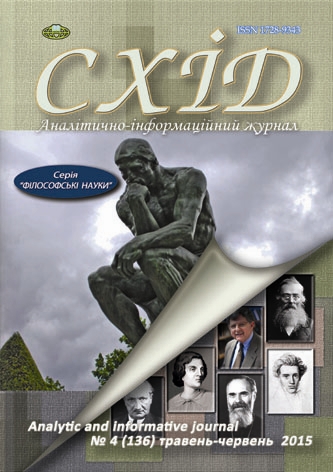Kierkegaardian motives in Heidegger's philosophy
DOI:
https://doi.org/10.21847/1728-9343.2015.4(136).48356Keywords:
category, Augenblick, Existenz, paradigm, historiography, doxographyAbstract
The article aims at critical assessment of methodological approaches to historical analysis of Heidegger's references to Kierkegaard. Heidegger's relation to existentialist philosophy seems to be one of the is sues which are deeply contaminated by the philosopher's ambivalent self-interpretations distorting the course of objective historical and philosophical study of real links between Heidegger's discourse and the legacy of existentialist thinkers. Analysis of reflexive literature on the problem of how to identify the character of interference between philosophical discourses of Heidegger and Kierkegaard allowed revealing the critical lines of doxography and historiography. Doxographical approach his a verted from the dimension of concrete texts to logical an achronistics peculations over seemingly evident contextual influence of Kierkegaard on Heidegger. Such strategy is legitimate to sustain logical descriptions of the categories exempted from the certain paradigm butitis use less to reveal factual genealogic all inks between the discourses of the two philosophers. Descriptives tudies seem to fallprey to Heidegger's hermeneutic ambiguity in referring notsomucht o Kierkegaard but rather Kierkegaardianism, a superficial filiation of existential philosophy. It is proved that historiographical approach enablesto objectively examine genetic relations of Heidegger's categories to their homonymous doubles in Kierkegaard. Such Kierkegaardian categories as Existenz and Angst come to Heidegger through Jaspers an dare taken int he contextbof Augustine and Luther. The only category directly taken by Heidegger from Kierkegaard is Augenblick.
Downloads
References
Anz W. (1991), Heidegger’s dialogue with tradition, in: Martin Heidegger’s philosophy in our times, Nauka, Moscow, pp. 53-61 (rus).
Bibikhin V. (2009), Early Heidegger: Seminar materials, Saint Thomas Institute, Moscow, 536 p. (rus).
Kierkegaard S. (2009), Philosophical fragments, Saint Thomas Institute, Moscow, 192 p. (rus).
Dorofieiev D. (ed.) (2004), Martin Heidegger, RChHI, Saint-Petersburg, 576 p. (rus).
Mikhailov I. (1999), Early Heidegger: between phenomenology and philosophy of life, Progress, Moscow, 284 p. (rus).
Safranski R. (2005), Heidegger: A master from Germany and his time, Molodaia gvardia, Moscow, 614 p. (rus).
Buben A. (2012), The perils of overcoming “worldliness” in Kierkegaard and Heidegger, Gatherings, p. 65-88 (eng).
Heidegger M. (1983), Die Grundbegriffe der Metaphysik, Vittorio Klostermann Publ., Frankfurt am Mein, 560 s. (ger).
Kisiel Th. (1993), The genesis of Heidegger’s Being and Time, University of California Press, Los Angeles, 620 p. (eng).
Pöggeler O. (1990), Martin Heidegger’s way of thinking, Humanities press international, New Jersey, 306 p. (eng).
Downloads
Published
How to Cite
Issue
Section
License
Copyright (c) 2015 Viacheslav Stepanov, Iryna Luchynska

This work is licensed under a Creative Commons Attribution-NonCommercial-NoDerivatives 4.0 International License.
1. Authors bear responsibility for the accuracy of facts, quotations, numbers and names used.
2. Manuscripts are not sent back.
3. The publisher does not always agree with the authors' opinion.
4. The authors reserve the right to authorship of the work and pass the first publication right of this work to the journal under the terms of a Creative Commons Attribution-NonCommercial-NoDerivatives 4.0 International License. This license allows others to distribute (copy) the published work for non-commercial purposes, provided there is mandatory attribution to its authors and a link to the first publication in our journal.
5. The authors have the right to conclude separate supplement agreements that relate to non-exclusive work distribution in the form in which it has been published by the journal (for example, to upload the work to the online storage of the journal or publish it as part of a monograph), provided that the reference to the first publication of the work in this journal is included.

